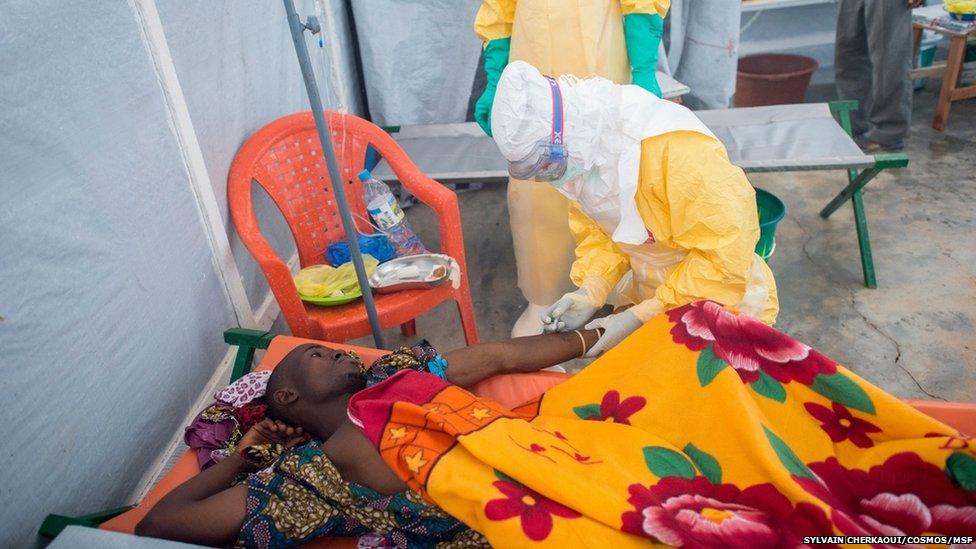Ebola outbreak: Sierra Leone angry at Australia visa ban
- Published
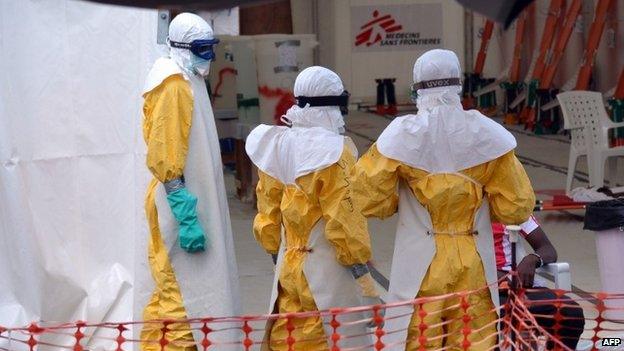
There have been 4,922 deaths from the Ebola virus, according to the World Health Organization's latest figures
Sierra Leone has condemned Australia's decision to suspend entry visas for people from Ebola-affected countries in West Africa as "counterproductive" and "discriminatory".
The move has also been criticised by Amnesty International.
And UN Secretary General Ban Ki-moon has said travel restrictions will severely curtail efforts to beat Ebola.
Immigration Minister Scott Morrison: "These measures include temporarily suspending our immigration programme... from EBV affected countries"
Nearly 5,000 people have died from the virus, the vast majority of them in Sierra Leone, Liberia and Guinea.
In other developments:
Eighty-two people who had contact with a toddler who died in Mali are now being monitored
A Dallas nurse who contracted Ebola in the US from a Liberian patient but is now free of the virus has been discharged from hospital
New US federal guidelines say medics returning from treating Ebola patients in West Africa should be monitored but not placed in quarantine - but some states say they will continue with their quarantine polices
President Barack Obama has said policy for returning medics should be based on science and not fear - he said it was important not to discourage US frontline workers from fighting Ebola
Separately, the US Army has imposed a 21-day monitoring period for all soldiers returning from the region
'Protect Australians'
The Australian government announced on Monday that it was cancelling non-permanent or temporary visas held by people from the affected countries who were not yet travelling, and that new visa applications would not be processed.
President Obama: "We don't want to discourage our healthcare workers from going to the frontlines"
Permanent visa holders yet to arrive in Australia must undergo a 21-day quarantine process before departure.
Immigration Minister Scott Morrison told parliament: "The government's systems and processes are working to protect Australians."
But Sierra Leone's Information Minister Alpha Kanu described the move as "too draconian", insisting that measures put in place at Sierra Leone's Freetown airport had successfully prevented anyone flying out of the country with Ebola.
"It is discriminatory in that... it is not [going] after Ebola but rather it is... [going] against the 24 million citizens of Sierra Leone, Liberia and Guinea. Certainly, it is not the right way to go," he told Reuters news agency. "This measure by the Australian government is absolutely counterproductive."
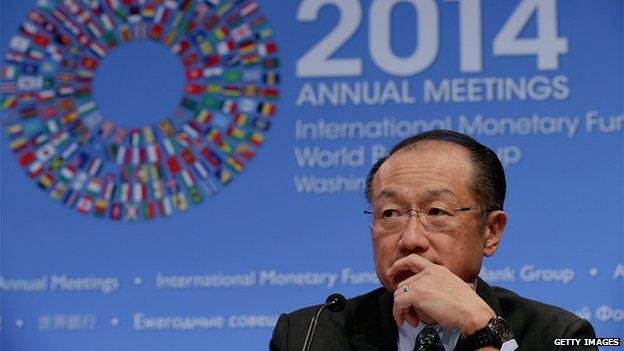
World Bank President Jim Yong Kim made an emotional appeal for help
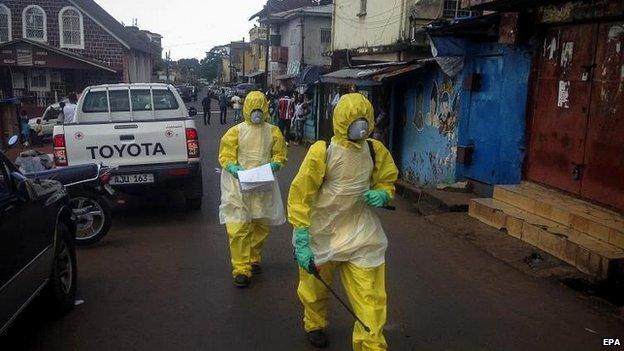
Health workers arrive to pick up the body of a young victim in Freetown, Sierra Leone
Ugandan government spokesman Ofwono Opondo said: "Western countries are creating mass panic which is unhelpful in containing a contagious disease like Ebola.
"If they create mass panic... this fear will eventually spread beyond ordinary people to health workers or people who transport the sick and then what will happen? Entire populations will be wiped out."
Amnesty International said Australia was taking a "narrow approach".
A spokesman for the human rights group said the ban made no sense from a health perspective but ensured that vulnerable people were trapped in a crisis area.
'Fear factor'
Meanwhile, the president of the World Bank has appealed for thousands of medical workers to volunteer and help contain the growing Ebola outbreak in West Africa.
The BBC's Gabriel Gatehouse reports from Monrovia in Liberia: ''Ebola robs its victims of their dignity''
Jim Yong Kim said at least 5,000 medics and support staff were needed to beat the disease.
Many potential recruits were too scared to travel to West Africa, he added.
Mr Kim was speaking during a visit to Ethiopia, where he accompanied the UN secretary general and African Union chairwoman Nkosazana Dlamini-Zuma.
"Right now, I'm very much worried about where we will find those healthcare workers," he said.
"With the fear factor going out of control in so many places, I hope healthcare professionals will understand that when they took their oath to become a healthcare worker it was precisely for moments like this," he added.
Mr Ban said that transmission rates in West Africa continued to outstrip the pace of the international response.
On Tuesday, Mr Obama backed updated guidelines issued the day before for people returning from West Africa to the US.
Dr Stacey Mearns talks of the "shocking" conditions on the ground as she works on the Ebola frontline in Sierra Leone
He said he did not want strict US quarantine policies to discourage "heroic" American healthcare workers from dealing with the virus at source.
"America is not defined by fear, it's defined by possibility," he said.
There have been 4,922 deaths from the Ebola virus, according to the World Health Organization's latest figures.
All but 27 of the cases have occurred inside Sierra Leone, Liberia and Guinea.
The virus spreads through close contact and health officials say stopping the spread of the disease in the areas hardest hit by the outbreak will prevent Ebola's spread to other countries.

Ebola virus disease (EVD)
How Ebola survivors’ blood is saving lives
Symptoms include high fever, bleeding and central nervous system damage
Spread by body fluids, such as blood and saliva
Fatality rate can reach 90% - but current outbreak has mortality rate of about 70%
No proven vaccine or cure
Fruit bats, a delicacy for some West Africans, are considered to be virus's natural host

Have you been affected by the issues raised in this article? You can share your experience by emailing haveyoursay@bbc.co.uk, external
- Published28 October 2014
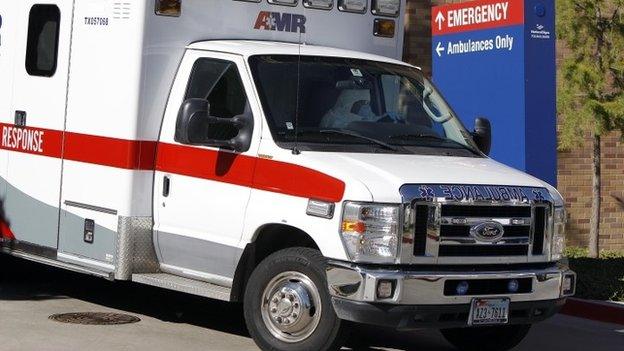
- Published28 October 2014
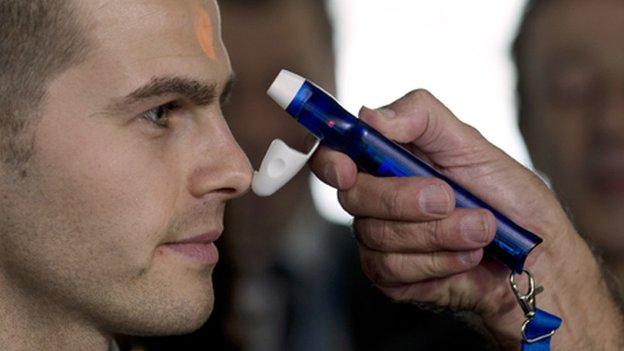
- Published27 October 2014
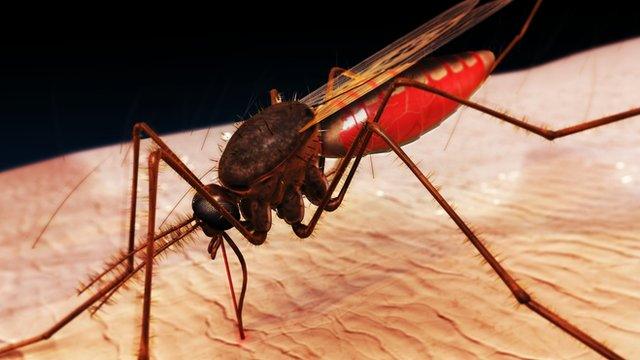
- Published13 November 2014
